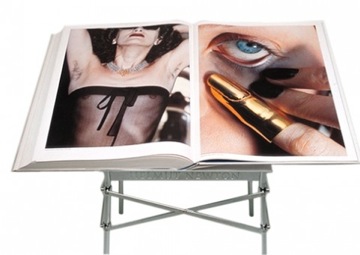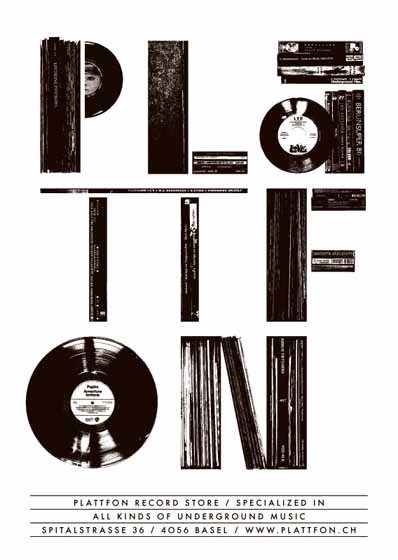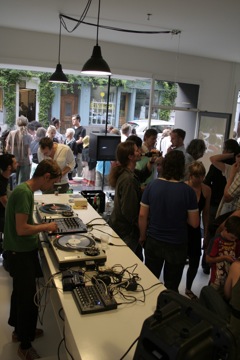
Spread from Helmut Newton's SUMO (1999). 464 pages. Courtesy Taschen, Cologne.
“This new edition is the fulfillment of an ambition conceived years ago. We jokingly referred to it as ‘Newton for the poor.’ ”
Oh, Benedikt Taschen, it’s quotes like these—and your line of über pricey, barge-like books like Helmut Newton’s SUMO, of which you speak—that always makes me wince at Taschen so. (Though, for us poor, there’s always been the oh-so-cheap stack of your invariably paper-thin monographs—Schiele or Klimt anybody?—in the remainder pile at bookstores everywhere.) Like some munchkin feather-weight wrestler, Newton’s original1999 monograph was two feet tall, with a weigh-in of 70 pounds. Mr. Taschen trumpets it as “The biggest and most expensive book production in the 20th century.” Today copies go for 10,000 euros. But in an ode to the book’s 10th anniversary, and with priceless recessionary timing, a smaller edition is about to be published for a mere $150, what Taschen reasons is “democratic dispersal.” Hmm.
If the publisher’s mania for printing books you can’t pick up and you certainly can’t afford (his editions for “the poor” notwithstanding) seems to auger well for the arrival of the recently released Kindle II (portable-to-the-extreme if not exactly cheap), I am not so convinced by his largess nor the technology that seeks to wipe it out. Nevertheless, with the constant heralding of the end of the publishing industry (despite Taschen, I don’t buy it) and the music industry (well, maybe) as we know them, I went to an opening last Friday night in Basel for a new record store cum art book shop cum gallery with the feeling that I might just be going back in time to a beautiful, beautiful place. Tonight there would be no Kindle, no online music downloading, just obscure CDs and LPs and posters and multiples and beautifully bound books with (printed!) text.
The opening inaugurated the new space for Plattfon, a celebrated local indie record store where one can find Tony Conrad’s early works for film, strange ambient recordings from the far-reaches of everywhere, and much Sun Ra (as well as much else); it also introduced Plattfon’s new roommate, Stampa, the long-vaunted Basel gallery and bookstore that was opening a new outpost here. Both venues are cheerily avant-garde in their artistic provisions. Accordingly, they appeared to be weirdly perfect bedfellows in the dazzlingly minimal white, black, and gray storefront, designed by two local architecture students, at Feldbergstrasse 48 in Kleinbasel.
The street in front of the store was thick with bicycles and beer drinkers when I arrived. Soon after, Michael Hiltbrunner—a Zurich artist and DJ—got on with his planned vocal performance inside. His first piece briefly explored quarter-tone movements; his second was a reprise of a “duet for trombone and voice” that originated with the celebrated DDR free-jazz trombonist Conny Bauer, who famously played it when the Berlin Wall came down. The slight Hiltbrunner put on a record of Bauer frenetically playing, and then began to sing along to it, his voice mimicking the sound of the trombone even as it proceeded to riff over it. Hiltbrunner’s performance was amiably neutral, despite its experimental undergirdings, and the audience appeared to greet it as such, with interest but no arty reverence.

Poster for Plattfon (2008). Designer: Marco Papiro. Courtesy Plattfon, Basel.
After Hiltbrunner was done, he smiled genially and stepped off, and two new DJs—Pragajena & Papiro—overtook the DJ booth that was improvised atop some long, low bookcases. The latter DJ was Marco Papiro, the excellent local graphic designer behind the ubiquitous Plattfon posters stuck to buildings all over Basel (and printed with outdated methods like the fax machine). As the DJs started spinning ambient street sounds and minimal beats, I moved over to the CD and record bins and immediately began coveting their contents. Then I blanched at the 30 Swiss franc stickers on most of them. I suddenly remembered why I hadn’t bought an actual, materialized CD since Christmas.
After I perused the wonderfully curated selection of books, most a nod to synaesthesia (and none from Taschen, as far as I could tell), I stepped outside for another beer and someone showed me an actual purchase they had just made. It was a small, beautiful hardback, published by Residenz Verlag, Wein, with a CD nestled into the black front cover. Viva La Poesia was scrawled across the CD. The book itself featured a series of texts (translated into German) by Allan Ginsburg and Nick Cave and Falco that chronicled their teaching stints at Vienna’s Schule für Dichtung. Only in Wien. Inside the store, the DJs spun some more records as people talked and shopped and hung out. Across the street, Basel’s notorious Friends Bar sat empty, its large exterior portrait of a ’90s-era Jennifer Aniston staring deep into my eyes. Or was she looking past me into Plattfon’s new space? Could she be their patron saint? Perhaps. In any case, knowing she and her friends would be there to keep an eye on things made me weirdly happy. I handed the reins to her. I was free to go home, put on some music, and read.

Opening of Plattfon + Stampa's new space, August 21, 2009, Basel, Switzerland. Photo: Valentina Stieger. Courtesy Plattfon, Basel.




Pingback: What’s Cookin at the Art21 Blog: A Weekly Index | Art21 Blog
Pingback: New Guest Blogger: Dehlia Hannah | Art21 Blog